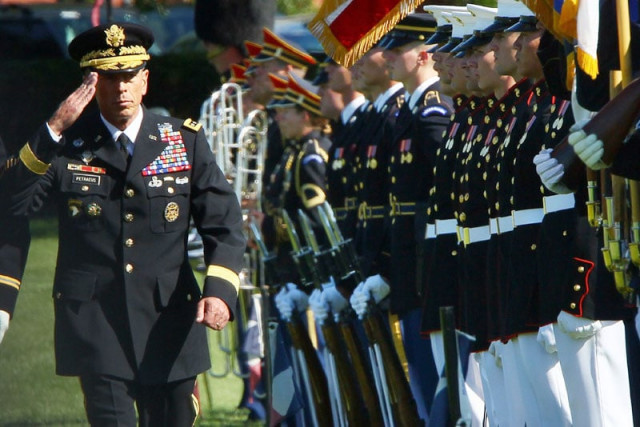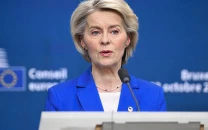General Petraeus hangs up his uniform
Petraeus will swap the military fatigues for a civil suit as he takes over as the director of CIA.

Petraeus, 58, considered to be the leading general of his generation, left his mark on the military in the post-9/11 era but his legacy as commander in both Iraq and Afghanistan remains an open question.
After 37 years, Petraeus officially retired from the armed forces at a ceremony at Fort Meyer, near Arlington Cemetery where so many fallen soldiers from current and past wars are buried.
Next week, he will don a civilian suit as he takes the helm at the Central Intelligence Agency, where he will confront some of the same enemies he faced in the military, including Islamist militants from South Asia to the Horn of Africa.
With his acute intellect and celebrity status, the four-star general is revered by some as a hero, but his detractors on the left and inside the military sometimes portray him as a hyper ambitious "King David" with designs on the presidency.
Successful General?
Petraeus made his name in Iraq, taking over in January 2007 when the war appeared on the verge of catastrophe.
Leading a surge of additional troops and encouraging his officers to cut deals with former militants, Petraeus was credited with salvaging the war effort.
The success of the troop surge in Iraq is still under debate, with some critics arguing that violence receded because Al-Qaeda's brutal tactics alienated Sunni tribal leaders.
Petraeus tried a similar approach to counter-insurgency in Afghanistan, backed up by a buildup of some 30,000 American troops.
Before stepping down in July after nearly a year as commander of the US-led international force there, Petraeus claimed progress against the Taliban as American troops rolled back the insurgents in the south while Afghan security forces expanded.
But violence has yet to decline in Afghanistan and the jury is still out on Petraeus' tenure there. Public doubts about the nearly ten-year-old war are mounting, with Washington planning a gradual troop withdrawal over the next four years.
His relations with Obama's civilian aides often have been strained, particularly during a protracted White House debate in 2009 over war strategy in Afghanistan.
Some of the general's supporters were frustrated that Petraeus was passed over for chairman of the Joint Chiefs of Staff, the military's top post.
The 101st Airborne Division paratrooper, who rewrote the Army's manual for counter-insurgency warfare, embodies the military's transformation since 9/11 as it shifted away from conventional methods.
His ideas have shaped a new generation of younger officers, who embraced the model of a lighter, more agile force working closely with intelligence agencies.
After former president George W. Bush named him to take over the faltering campaign in Iraq in 2007, the general's televised appearances before a restive Congress made for dramatic scenes.
"The situation in Iraq is dire. The stakes are high. There are no easy choices, and the way ahead will be hard," Petraeus once told the Senate Armed Services Committee.
"But hard is not hopeless," he said, invoking one of his trademark phrases. In some ways, he is an unlikely figure for an American general.
The Power-Point General
Instead of the popular image of the gruff, cigar-chomping commander barking out orders, Petraeus is an intellectual, a wiry long-distance runner fond of briefings with his power-point slides full of statistics and maps.
"I am going to manage you by slides," he told his troops in Iraq, according to the book "Fourth Star."
By the time he left Iraq, he was revered by his troops. "He'd made the Army feel smart again, and convinced his brigades and battalions that they could prevail," wrote the book's authors, David Cloud and Greg Jaffe.
The son of a Dutch sea captain, Petraeus has long been a star in the military.
Intensely competitive, he graduated from the US Military Academy at West Point in 1974, finished at the top of his 1983 class at the US Army Command and General Staff College, and went on to earn a doctorate in international relations at Princeton University.
He commanded the 101st Airborne Division during the 2003 invasion of Iraq, and quickly secured the northern region around Mosul.



















COMMENTS
Comments are moderated and generally will be posted if they are on-topic and not abusive.
For more information, please see our Comments FAQ